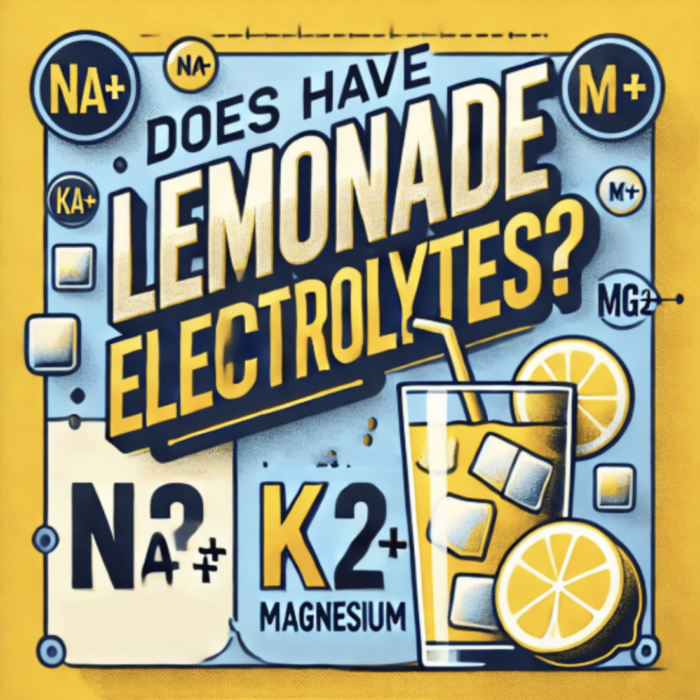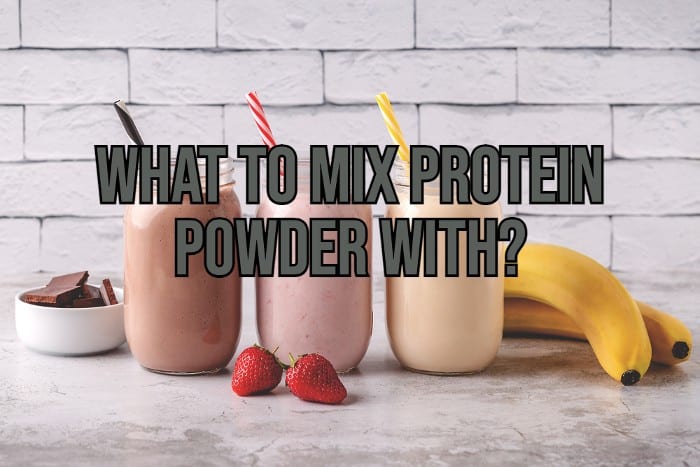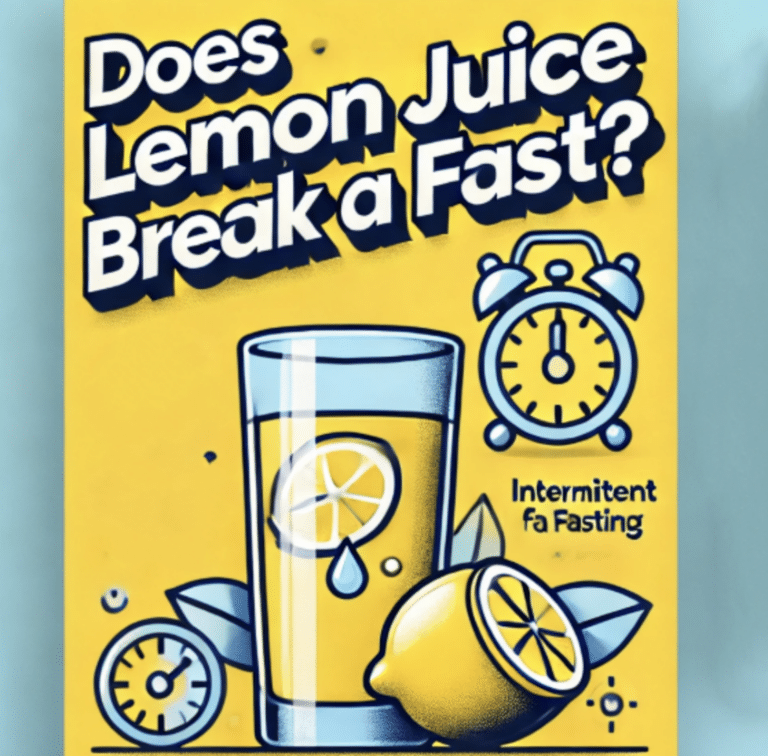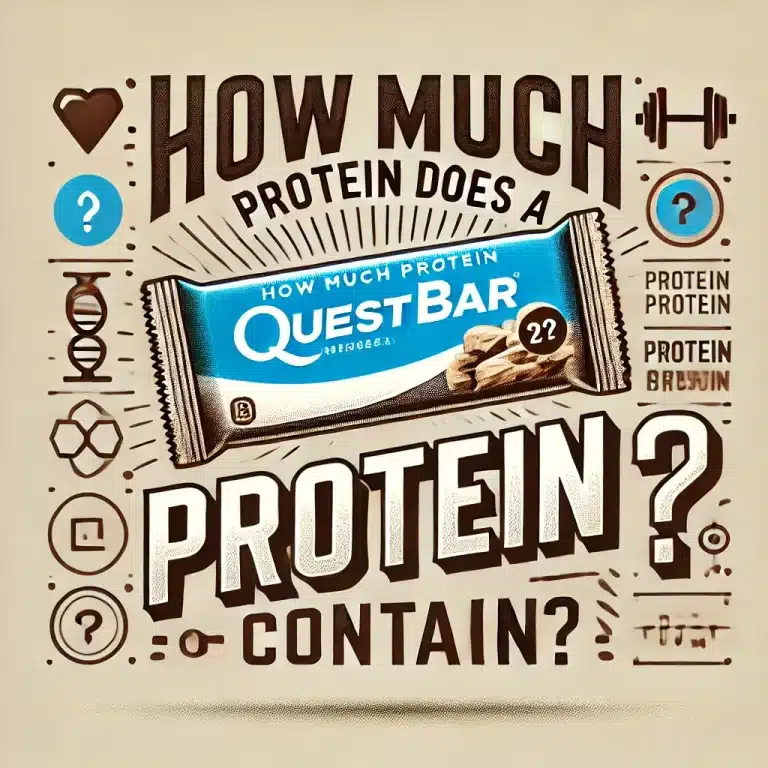Does Lemonade Have Electrolytes?
Lemonade has something classic about it. On a sweltering day, its vivid yellow glass transports one to childhood, summer breaks, and front porch chats. It’s refreshing, straightforward, and honest, it just hits different when the heat’s turned up and you’re yearning something cool and zesty. But in the era of functional hydration, recovery beverages, and fitness tracking, consumers are beginning to see past mere flavor. What is really in this stuff? they ask.
Especially if you follow wellness trends or are active, you have most likely heard the word electrolytes used. It appears in sports drink advertising, electrolyte supplements at the gym, and even in laid-back conversations following a demanding workout. We are told that general health, muscular recovery, and hydration depend on electrolytes. But can anything as commonplace as lemonade truly meet those criteria?
Today’s topic is does lemonade have electrolytes, and if it can really help you rehydrate as all those fancy drinks stacked up in the supermarket would suggest. Although the response is not a clear yes or no, it is most certainly more fascinating than you would have guessed.
Allow me to dissect it here.
Understanding Electrolytes and Their Importance:
Essential minerals with an electric charge, electrolytes assist in controlling several important body processes. Among these minerals are salt, potassium, calcium, and magnesium; they are very vital for preserving hydration, guaranteeing appropriate nerve action, and sustaining muscular contraction. The body may have muscle cramps, tiredness, and even more serious medical problems without a correct electrolyte balance.
Your body loses electrolytes, especially salt, and potassium when you sweat during exercise or extended physical activity; these must be replaced to preserve the best performance and recuperation. Drinking liquids high in these minerals can help bring equilibrium back and stop dehydration.
Key Functions of Electrolytes:
- Electrolytes assist control water content in and out of cells, therefore preventing either overhydration or dehydration.
- muscular contraction depends on appropriate electrolyte levels both for muscular operation and to avoid cramps or spasms.
- Electrolytes help the body to transmit electrical signals, therefore guaranteeing appropriate communication between muscles and neurons.
- They enable the body to maintain its pH levels, therefore preventing either too-acidic or too alkaline conditions.
Where Can You Get Electrolytes?
Natural sources of electrolytes abound in foods and beverages including:
- Sports drinks – Specifically formulated for electrolyte replenishment.
- Coconut water – A natural source of potassium and other key minerals.
- Dairy products – Provide calcium and magnesium, both essential for muscle and nerve function.
- Fruits and vegetables – Bananas, oranges, spinach, and potatoes are all rich in important electrolytes.
But what about lemonade? Does it provide enough electrolytes to make a difference? Let’s take a closer look.
Does Lemonade Contain Electrolytes?
Lemonade, in its simplest form lemon juice, water, and sugar does contain some electrolytes, but not in high amounts compared to dedicated electrolyte drinks. Here’s why:
Electrolytes Found in Lemonade:
- Potassium – Found naturally in lemons, potassium is a key electrolyte that supports muscle function and hydration.
- Calcium – Lemons contain small amounts of calcium, which plays a role in nerve signaling and bone health.
- Magnesium – Present in trace amounts, magnesium helps with muscle relaxation and preventing cramps.
While lemonade does provide some beneficial minerals, it lacks a key electrolyte sodium. Sodium plays a major role in maintaining fluid balance and is essential for replenishing what is lost through sweat. Without it, lemonade alone is not the best option for post-workout or high-intensity hydration. Additionally, store-bought lemonade is often high in sugar, which can lead to a quick energy boost but may also contribute to dehydration if consumed in excess.
For those seeking a drink that truly replenishes electrolytes, a simple homemade modification can make lemonade much more effective in maintaining hydration and restoring electrolyte balance. Let’s explore how you can create an electrolyte-packed lemonade at home.
How to Make Electrolyte-Rich Lemonade?
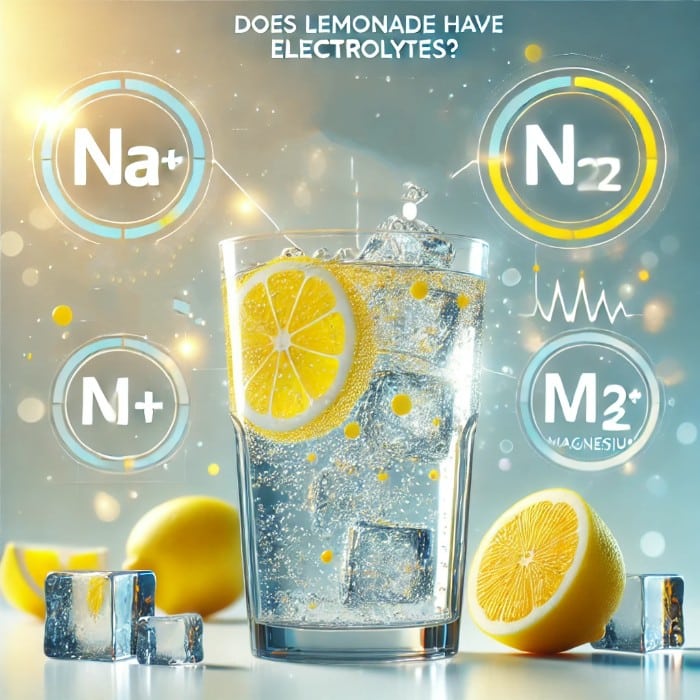
If you love lemonade but want to boost its electrolyte content, consider making a homemade version with added minerals. A few simple additions can turn your regular lemonade into a highly effective hydration drink that supports muscle function and fluid balance.
Key Ingredients for an Electrolyte Boost
- Lemon juice: A natural source of potassium, calcium, and magnesium.
- Sea salt: Provides sodium, an essential electrolyte that helps with fluid retention and nerve signaling.
- Coconut water: A great source of potassium, making it an excellent alternative to plain water.
- Honey or maple syrup: Adds a natural energy boost without the excessive refined sugars found in store-bought lemonade.
- Magnesium powder (optional): Helps with muscle recovery and prevents cramps.
DIY Electrolyte Lemonade Recipe
Ingredients:
- 2 cups water (or coconut water for extra potassium)
- Juice of 2 fresh lemons
- 1/4 teaspoon sea salt (for sodium)
- 1 tablespoon honey or maple syrup (natural energy boost)
- 1/4 teaspoon magnesium powder (optional, for muscle recovery)
- Ice cubes (optional)
Instructions:
- Mix all ingredients: Combine the lemon juice, sea salt, honey (or maple syrup), and magnesium powder in a large glass or bottle.
- Stir or shake well: Ensure all ingredients are fully dissolved for a consistent taste and electrolyte balance.
- Serve chilled: Add ice cubes if desired for a refreshing and revitalizing hydration boost.
- Drink and enjoy: This homemade electrolyte lemonade is perfect for replenishing minerals after a workout or on a hot day.
By making these small changes to your lemonade recipe, you can create a drink that is not only refreshing but also functional in supporting hydration and overall well-being. Unlike sugary sports drinks, this natural alternative provides essential minerals without artificial additives.
Considering Commercial Electrolyte Beverages
There are commercially available lemonade-flavored electrolyte solutions designed specifically for rapid hydration and electrolyte replenishment. For example, products like JBA ATIV ELECTROLYTE ORS LAVENDER LEMONADE are enriched with essential electrolytes, including potassium, magnesium, and zinc. These formulations aim to provide immediate hydration and support overall wellness.
If you are looking for widely available electrolyte drinks, Gatorade, Powerade, and Powerade Zero are popular choices. Gatorade is gluten-free and designed to replenish sodium and potassium lost during exercise. Powerade and Powerade Zero also provide essential electrolytes, but Powerade Zero offers a sugar-free option for those who want to hydrate without extra carbohydrates. These beverages are formulated to support hydration during intense physical activity and can be a convenient alternative to homemade electrolyte lemonade.
It’s important to note that while such products can be effective, some may contain added sugars or artificial ingredients. Always read the labels to ensure the product aligns with your dietary preferences and needs.
The Role of Lemonade in an Anti-Inflammatory Diet
Lemonade does more than just hydrate, it can also play a role in reducing inflammation when prepared with the right ingredients. According to the U.S. Department of Veterans Affairs, adding citrus fruits like lemons to your water can enhance flavor and provide additional health benefits. Lemons are rich in vitamin C, which is known for its antioxidant properties and ability to support the immune system.
How Lemonade Supports an Anti-Inflammatory Diet
- Rich in Antioxidants: The high vitamin C content in lemons helps neutralize free radicals that contribute to inflammation.
- Alkalizing Properties: Despite being acidic, lemons have an alkalizing effect on the body, which may help reduce chronic inflammation.
- Supports Digestion: Lemonade made with fresh lemon juice can stimulate the production of digestive enzymes, promoting better gut health and reducing bloating.
- Combats Oxidative Stress: The antioxidants in lemons, combined with ingredients like ginger or turmeric, can further support the body’s natural defense against inflammation.
Boosting Lemonade’s Anti-Inflammatory Benefits
If you’re looking to maximize the health benefits of your lemonade, consider enhancing it with additional anti-inflammatory ingredients:
- Ginger: Contains powerful anti-inflammatory compounds that can help ease muscle soreness and digestive issues.
- Turmeric: Known for its curcumin content, turmeric has been shown to reduce inflammation and support joint health.
- Honey: A natural sweetener that provides antibacterial and anti-inflammatory benefits.
- Cayenne Pepper: A small dash can promote circulation and has anti-inflammatory effects.
Anti-Inflammatory Lemonade Recipe
Ingredients:
- 2 cups water (or coconut water for added electrolytes)
- Juice of 2 fresh lemons
- 1 teaspoon grated fresh ginger
- 1/4 teaspoon turmeric powder (or fresh turmeric juice)
- 1 tablespoon honey or maple syrup
- A pinch of cayenne pepper (optional)
- Ice cubes (optional)
Instructions:
- Combine all ingredients in a large pitcher or glass.
- Stir well until the honey or maple syrup dissolves.
- Let sit for a few minutes to allow the flavors to infuse.
- Serve chilled and enjoy a refreshing, anti-inflammatory boost.
By incorporating these ingredients, your lemonade can go beyond hydration and become a powerful tool in promoting overall health and reducing inflammation.
Is Lemonade a Good Alternative to Sports Drinks?
Many people turn to sports drinks like Gatorade, Powerade, and Powerade Zero to replenish electrolytes lost through sweating, but is lemonade a good alternative? The answer depends on how it’s prepared.
Traditional store-bought lemonade, while refreshing, lacks the optimal electrolyte balance needed for recovery after intense exercise. Most commercial lemonades contain minimal sodium, which is crucial for fluid retention and hydration. In contrast, sports drinks are specifically formulated with sodium, potassium, and carbohydrates to quickly restore lost fluids and energy.
How Does Lemonade Compare to Sports Drinks?
| Beverage | Electrolytes | Sugar Content | Best For |
|---|---|---|---|
| Traditional Lemonade | Low (some potassium, calcium, magnesium) | High | General hydration, refreshment |
| Homemade Electrolyte Lemonade | Moderate (added sodium and coconut water) | Moderate (natural sugars from honey or maple syrup) | Post-workout hydration, electrolyte replenishment |
| Gatorade (gluten-free) | High (sodium, potassium) | High | Intense workouts, endurance activities |
| Powerade | High (sodium, potassium, magnesium) | High | Sports performance, hydration recovery |
| Powerade Zero | High (sodium, potassium, magnesium) | Low | Hydration without extra sugar, weight management |
When to Choose Lemonade Over Sports Drinks
- For everyday hydration: If you’re simply looking for a refreshing drink on a warm day, homemade lemonade (especially with added sea salt and coconut water) can provide hydration with natural ingredients.
- For light exercise: If you’re engaging in moderate activity like yoga, walking, or a short run, lemonade with added electrolytes can be a decent alternative.
- For an anti-inflammatory boost: Adding ginger, turmeric, and honey can provide additional health benefits that traditional sports drinks don’t offer.
When Sports Drinks Are the Better Choice
- After intense workouts: If you’ve been sweating heavily, a sports drink like Gatorade, Powerade, or Powerade Zero will replenish sodium and potassium faster than lemonade.
- During endurance activities: Long-distance running, cycling, or high-intensity training requires faster electrolyte replacement than sports drinks provide.
- If you need rapid energy replenishment: The carbohydrate content in sports drinks helps restore glycogen levels more efficiently than lemonade.
How to Make Lemonade More Like a Sports Drink
If you want to turn lemonade into a sports drink alternative, here’s what you can do:
- Add sea salt: This increases the sodium content, which is key for hydration.
- Use coconut water: A great source of potassium that mimics electrolyte drinks.
- Incorporate honey or maple syrup: These natural sugars provide quick energy.
- Include magnesium powder: Helps with muscle recovery and reduces cramps.
By modifying lemonade with these simple additions, it becomes a more effective electrolyte drink, comparable to sports drinks but without artificial additives.
Final Thoughts
So, does lemonade have electrolytes?
Yes, but not enough to be considered a reliable electrolyte-replenishing drink on its own. While lemons provide potassium, calcium, and magnesium, they lack sodium, making them incomplete for post-exercise hydration. If you love lemonade and want to boost its benefits, making your electrolyte-infused version is the best way to go.
For a truly effective hydration solution, consider pairing lemonade with electrolyte-rich foods or adding sea salt and coconut water to enhance its mineral content. Stay hydrated and enjoy your lemonade in a way that supports your body’s needs!
